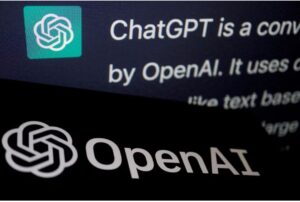OpenAI breached US authors’ copyrights, two American authors on Wednesday filed a lawsuit against OpenAI in a federal court in San Francisco, saying in a proposed class action that the business improperly exploited their works to “train” its well-known generative artificial intelligence system ChatGPT. The authors are from the United States of America.
Two authors named Paul Tremblay and Mona Awad from Massachusetts have claimed that ChatGPT violated the authors’ copyrights by mining data that was copied from hundreds of books without first obtaining permission.
Attorney Matthew Butterick, who represents the authors, declined to comment on the matter. A request for comment was submitted to OpenAI, a private startup backed by Microsoft Corp, but representatives from the company did not answer quickly.

Related;Microsoft’s Azure AI Studio lets developers build their own AI ‘copilots’
The content that is used to train cutting-edge AI systems has been the subject of multiple legal disputes. Plaintiffs include source-code owners who have filed complaints against OpenAI and Microsoft’s GitHub, as well as graphic artists who have filed complaints against Stability AI, Midjourney, and DeviantArt.
The parties who are being sued have contended that their systems make appropriate use of the works that are protected by copyright.
Conversational responses are given by ChatGPT to text prompts entered by users. It reached 100 million active users in January, only two months after it was released, making it the application with the fastest-growing consumer user base in the history of consumer applications.
Large amounts of data are harvested from the internet and used by ChatGPT and other generative AI systems to generate new content. The case that was filed by Tremblay and Awad claimed that books are a “key ingredient” because they provide the “best examples of high-quality longform writing.”
According to the allegations made in the complaint, OpenAI’s training data included over 300,000 books, some of which came from unethical “shadow libraries” that sell copyrighted books without permission.
Related;OpenAI’s ChatGPT app tops 500K downloads in just 6 days
Awad is a well-known author of books, some of which include “13 Ways of Looking at a Fat Girl” and “Bunny.” Novels written by Tremblay include “The Cabin at the End of the World,” which was turned into a movie by M. Night Shyamalan titled “Knock at the Cabin” and released in February of this year.
Tremblay and Awad reported that ChatGPT was able to provide “very accurate” summaries of their books, which suggests that the books were included in its database.
OpenAI breached US authors’ copyrights the action was filed on behalf of a worldwide class of copyright owners whose works OpenAI is accused of misusing, and it wants monetary damages in a sum that has not been determined.
Follow our socials Whatsapp, Facebook, Instagram, Twitter, and Google News.








